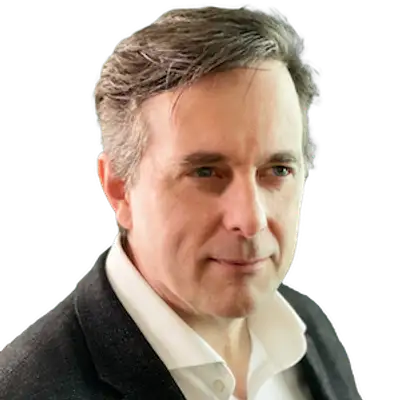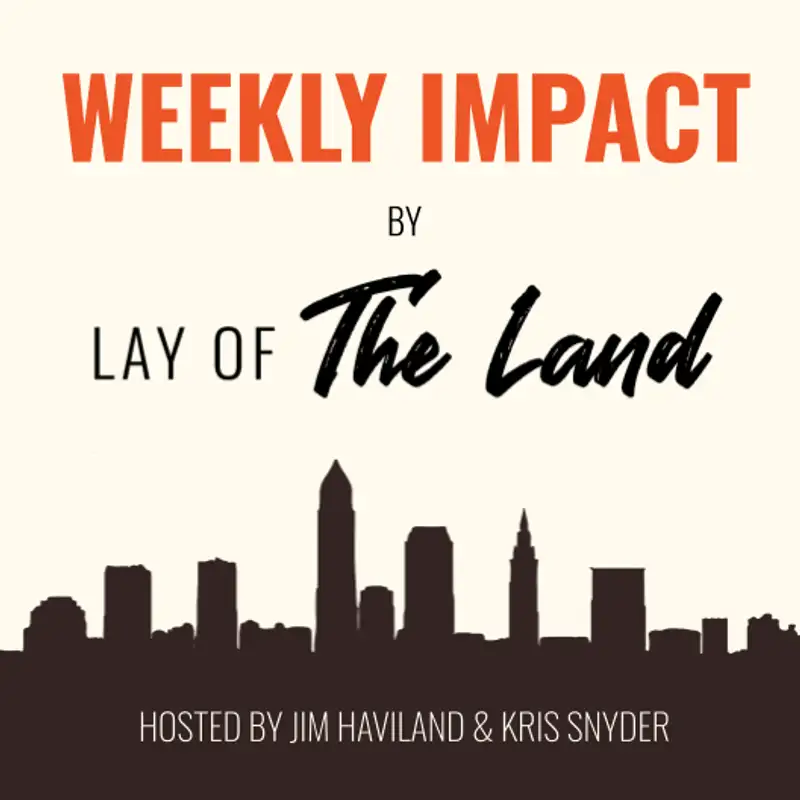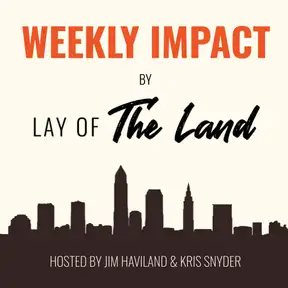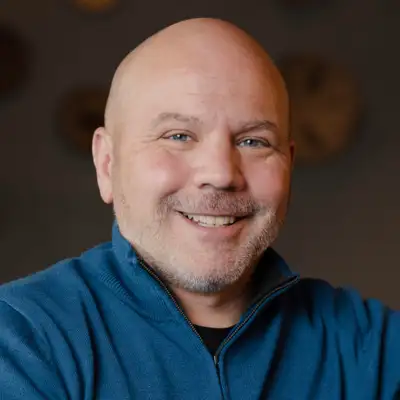8-5-24 Joshua Edwards, Digital-C, Community Flywheel, EPI
Jim Haviland & Kris Snyder (00:01)
Welcome everybody. This is Lay of the Land weekly impact. I'm Jim Haviland. I'm Kris Snyder. And Kris, is, what's today? I didn't write it down.
It's like August 4th or something. It's August now. It's August 5th. I think it's August 5th. Yeah, 5th. Geez. All right, great. We the time. So we're about to drop as the guest goes live. Awesome. Tonight, sometime. Looking forward to that. So we can't wait to hear you everyone's feedback. Please let us know how we're doing. Bare -boned stuff, guys, but that was always the point. We wanted to get by you quick. So Kris, we've got a great podcast, LadyLand podcast, that's covered this, number 177, Joshua Edmonds, Digital C. Kris, we've got some history here.
Yeah, we do. It was fun to hear, right? Like, his journey, his part of it. Like, often most of the things we do, we're standing on the shoulders of giants that came before us, the folks who built things, you know, sacrificed things along the way. And I think that that was part of what we were listening to. Yeah. So let's first cover how cool what he's doing is, and then we'll go back over the history. Right. So we want to give him props. you know, covering the digital divide, you know, solving the problem that goes all over the place. We know that the
is infrastructure. We couldn't do any of the things we do without it, Kris. Yeah, when it goes down, it's almost worse than electricity going out. Yeah, and we'll cover that, because it's really, you lose one, you lose both mostly. But I love the way Josh was talking about really our right to it, to good infrastructure like this. And I love talking about the technology. I it's really cool stuff. And we go over the history a little bit. I'll let you know what the original thought on what this is supposed to be. But this notion, you know, the
canopy product, 17 bucks a month? Yeah, 17, 18, something like that. Something like that? How much do we pay? Way too much. Way too much. Like a couple orders of magnitude more. But that's what a great thing. And there's the notion that you can use the infrastructure that's already existing and then beam it all over the place and have very little infrastructure in -house and gives you automatic Wi -Fi. That's just brilliant to me.
No more call before you dig moments, right? Like somebody chops a wire something goes down and then you're all out So I think this ability to kind of run it up and then broadcast it and then grab it especially highly dense areas This is really good stuff. I this is even a version of this they do actually in real areas where they're using using backhaul, you know, either electronics or
Microwaves, which I'll talk more about in a minute. And then really the fact that he's doing both infrastructure and also the education and how to use this stuff, which is really important. Yeah, his library discussion, When the internet was first coming out in the 90s and how the libraries were going to use sensors. superhighways. Exactly, digital highway. But that's a really good, cool call out, right? Like our schools have been hopefully doing this. I think our schools got forced to do this when COVID happened and all of sudden everything had to go online and they realized what they did and didn't have an education, not just equipment, kind
the hand there too. Yeah, I I think it's great stuff. mean the thing for me why this is so tremendously important Kris is that so much of our population is not available to us to do this kind of work. The work that we know is important and we can't build generational wealth in all of our communities unless we can do this work. Yeah, well just healthcare. mean just as he was talking about I was thinking like just healthcare on that you we take our app related to the Cleveland Clinic or whatever right.
Like how do you do that if you don't have some kind of connectivity, right? You're still in self advocacy I've talked to so many people that have been able to because of you know real stuff on the internet Advocate for themselves from a health perspective because they have access because they can go and then the doctors can't keep up with this I mean, there's like nothing against doctors like but you're gonna be the best person to understand your Health your current health so be able to advocate yourself be able to do research for yourself and say you know what? Here's the 15 things that I see out there
Let's pick it together and that's a much better model than we got right now Well, I do I know we're talk about history for a moment. I just a little bit of history for you and I He talked about the Blackberry movie. Yeah, and I don't know if you and I ever talked about the Blackberry movie because it was our life there for Yeah, I've seen it. I've been seen it. I've seen it and it's actually got a lot of it has a lot of fact to it for those who don't know I mean Jim and I started work with the Blackberry folks in 2004 and All the way our way through, you know, so they weren't anything
And I knew you know I spent time like with the all the major players right like so it's really interesting. How many times were we there advocating for like listen guys I know this feel this iPhone thing seems like a toy, but it's real it's coming We have to change our tone, and they just couldn't get it Yeah I was with Jim Basili, and he was he showing the pearl to CIOs in Akron when it was like you know but some of our largest customers at the time like D -Bold and Temkin and and That was just that was just on the cusp of actually doing
and other things on it. And what they just weren't getting was that what they were doing was going to be passed. And people were talking about the iPhone at that moment as he's showing the pro, he's like, nah, not a thing. It's like, maybe not buddy. But anyways, but I loved how Joshua was talking about it today on the podcast was all about being in that entrepreneurial moment, being able to come from behind moment and take it forward. And I think that spirit of entrepreneurialism is awesome.
You know, it is the core entrepreneurial drive. It's like, this could be better. We deserve better. Right? He says that. And to know that there is a better out there and ask new questions. It's like the core leadership is humility. Yeah. You that you just it's not about it's about getting it right, not being right. And I think people forget that they like, I felt so good feeling like I was right. And then that's but that's not how we get to the next place. So let's talk about some of the history, Kris.
So let's go back to.
In 2000, when I first got here, I got pitched by somebody. I got pitched all the time by people doing startups. I got this idea. And the idea was to create Wi -Fi all throughout Cleveland using the metro rail lines, the rapid transit rail lines as backhaul for internet to put up the very first version of Wi -Fi in the area you could get around the stops.
microwave backhaul along those lines and we're comparing it to how we laid the telegraph lines back in the early days. Back when we were building the railroads they also put telegraph lines out there. That's how we got to be able to communicate from East Coast to West Coast over telegraph.
I thought that was a great idea and we had so many really cool things to try to make that happen. We were talking to Cisco because there's going to be a lot of infrastructure. then I was also putting together this thing called Plan X for Cleveland, which is just really
I guess my early version of Lay of the Land, you're like, hey, what are all the cool things people are doing? Let's get everyone to start doing these things. And it's basically like stone soup. Everyone had great ideas. Like, we'll go do that cool idea. Because now it's part of Plan X. And I had this thing, and I would go around and have interviews with people like, hey, here's all the cool things happening in Cleveland. How can you help? And I met, and someone interested me to love GONNIC.
And Lev Gontek says, Jim, I have this dream of solving the digital divide with all this dark fiber underneath the city. I think it's cool that you've got this microwave backhaul thing, but let me tell you, there's all this dark fiber. Right. And Lev was the CIO at Case Western Reserve at the time? was the CIO at Case Western Reserve. that's when he met our mutual friend.
who helped pull all that together was part of our MCPC journey, Scott Rorick. And that's what set all this motion. But it was all those things. was part of Plan X was to have not only the infrastructure and talk about his infrastructure, but also to say, what are the things we can go build on it? And what entrepreneurial journeys can we create by creating a Wi -Fi universe that's way ahead? And then we ended up...
It was harder. It always is. But you know, one of the stories I was when I was back there doing all that work was relating it to early Cleveland, but not early Cleveland for a long time. But one of the one of the mayors here at the turn of the last century, a guy named Mayor Tom Johnson. 1906, he forms the world's first.
public electric utility, arguing that there's no way that we can build this economy without available electricity for everybody. Every business, every home needs electricity for us to move forward. Because up until that point, there already were people who buy electricity from 10, 20 years earlier, but it was touted as a luxury. Not unlike what we see with internet now. But it's not a luxury. You can't
You need this. that was when I was working down the research triangle in in North Carolina was the same thing It was the at that point it was the governor Was picking up on something that James Buchanan Duke did early on when he created Duke Energy after he created Duke University He says we're never gonna get out of this agrarian society unless we make electricity available to everybody and he Got the idea from our mayor here Tom Johnson, and that's why he created Duke Energy
which today is a giant and was one of our clients when we had VoxMobil. Because they believe in their heart of hearts that people die when the power goes out. I remember some of those meetings. And our story converged like that with Brett Lindsay, who was on show number 27, because he got into all that and saw another, this is everywhere.
And that's what Everstream became. Like, the taking advantage of the dark fiber everywhere.
One Cleveland to one community and then one community spun out to become ever stream and I think what eventually became digital sea assets are all kind related is another Brett Lindsay venture as well and and what I do think all that culminates together and you go gosh if we're gonna have and believe in this sense of community and those that you know shouldn't be left behind right like this is this is the right this is the right that we should all be working towards and I
like the, you know, hey this is the right thing to do argument, but I also think it's tremendously important for us as stewards of the local economy to know that we're leaving a lot of great assets behind. Right. Within people. The most important part we have is people. We need people that are going to do great things. You know, we have to be leaders building leaders building leaders and the only way to do that make sure is everyone has access to all the best stuff. So I mean it's a pure, you know, economics argument here.
I don't have to be about right or wrong, it's economics that we do it.
So we should do it. right. So great episode. Great. Josh, for doing that. We appreciate it. so, Kris, so this leads into our community flywheel conversation. So we've had some great stuff this last week saying our community building is working and that we heard from our good friend Jeffrey about things going on that he's finding out that the people he's introduced are starting to do things on their own. But in the name of the same stuff. Yeah. And the core concept here that we've been promoting is like to do introductions of value from one human to
other and you don't always know the ripple effect of where that's gonna go or what shape it's gonna take form. But what we're starting to do is you can start to hear and see others gathering together, others doing things and I think Jeffrey's comment was, shoot I just lost who it is. Andrew. Andrew Rising, right? Yeah, yeah. And the formation of an event that they did and that all the people there you could trace back the lineage to lay the land in introductions of value. Absolutely, absolutely. Which is the flywheel, right? We want to begat its
You've got to believe it actually works. You're gonna be playing the long game right and that the infinite game in if you really want to have a And this is the thing when I first came back to Cleveland, you know in 2000 after Seattle it's like my realization was if I'm gonna be here I'm gonna make this as cool as possible, right and what's missing? What can I do to help make it cool? And so just starting that that journey of let's get people to start working together in a way. They're not yet right now It's not that big. It's not because anyone's bad or anyone stupid. It's just
Like it is hard work to pull this together. And sometimes we miss that building community is what makes it all work better for everybody else. Trust at scale. Yeah, trust at scale. And people get lost in the creation of commerce and community and the intersection they're in, meaning that like, well, if I just set out to do commerce, right, I want to do transactions, business with people. And I don't invest in the community first, right? It's going to be a different climb. And so think the belief is that let's invest in the entrepreneurial community, lay of the
If you will, right? Yeah, we'll get there right and then the commerce will come so So that's great stuff Kris. So let's I want to close out with them. I know you're working this week with 490 with the Exit planners Institute exit planning Institute and it's such a gem that most people it was purchased by the other Kris Snyder and his son Scott Snyder and then moved it from Chicago and I think was 2014 It's now 5000 exit planners. They're adding
a quarter. this all over the country? All over the world? All over the country for sure. They might have some regional, beyond the United States, reach as well.
Anyways, the thought of this being that we're gonna try to launch a partnership between 90, we think we've got a great template. They've got a BOS, if you will, business operating system called Value Acceleration Methodology, which looks a lot like others like EOS and Pinnacle. Because they all come from the same stuff, The original stuff. Well, they come from a place of need. Yeah. I think that's the thing that we really just need to remember. Yeah, I mean, think, you know,
Please our advocacy as always folks is you have to have an operating system, know If you have an intentional operating system, you will have intentional results If you have an accident one, you'll have accidental results and certainly Exit Planning Institute is you know believes that too. I know I spoke to those folks and they've been working hard To make sure that their exit planners have a great rate of gooding from hey, this is where you are This is what a great exit looks like for you And here's the here's the gap and you've got to fill that gap and an operating system is almost always part of that that journey
So that'll be exciting to see how that turns out. I'm looking forward to it. We'll give you an update next week. All right. Thanks everybody. This has been Lay of the Land Weekly Impact. I'm Jim Havilland. I'm Kris Snyder. We'll see you next week. Thank you. Bye.
Creators and Guests



